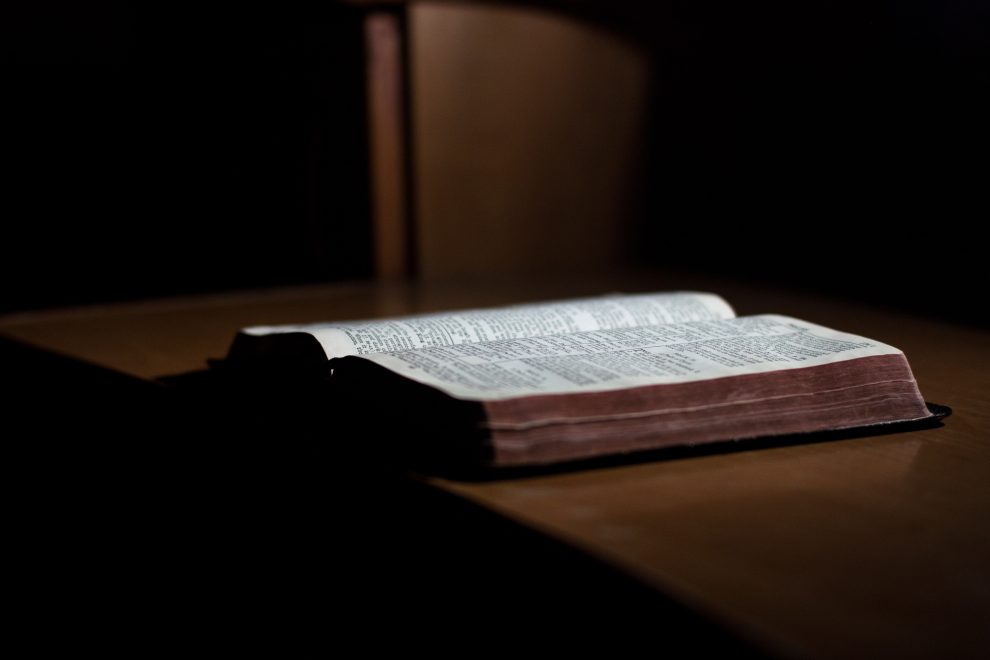This scripture scholar invited U.S. Catholic readers to crack open the Good Book.
Alec Baldwin and Steve Martin may currently be tied in the competition for the number of times they have hosted Saturday Night Live (15 each), but in the somewhat less watched celebrity contest for the “Most Frequently Interviewed by U.S. Catholic” honor, there is a clear winner: With five interview appearances between 1976 and 1986, the late scripture scholar Father Eugene LaVerdiere, S.S.S. has no rival even in striking distance. The next runner-up, with three interviews, is the late liturgist Father Godfrey Diekmann, O.S.B.
LaVerdiere, who died in November 2008, was a priest of the Congregation of the Blessed Sacrament, a scripture scholar, and for many years the editor of Emmanuel magazine. What made him so popular—and not just with the U.S. Catholic editors who kept inviting him back—was the “special talent” the magazine noted in its introduction to his first interview in November 1976: “He not only knows what he’s talking about, he knows how to talk about it.”
LaVerdiere had a passion for making the Bible accessible and for helping Catholics find guidance in scripture for their own lives today. He said his goal was to get people excited so they actually “want to read the Bible—not that they are made to read it.”
“We don’t need to make people feel dependent on scholars or commentaries or anything like that,” he said in his January 1986 interview. “In my role as a scripture scholar, I see myself as having a responsibility to the whole church to help people interpret the Bible better. But I want to free people up, not make them subject to me. I want to free them up and then listen carefully to what they have to say.”
In fact, LaVerdiere found that “it’s amazing what [insights] someone who is unlettered in the Bible is able to come up with. Many people are apt to put their fingers on something that we scholars haven’t seen, because we’re always working within certain channels. . . . But here’s a new person with a fresh experience who raises a question.”
In that same interview LaVerdiere explained, “Little by little I came to realize that what comes first . . . is the actual living of people in a Christian community. . . . The Bible can help us articulate what life is all about; that’s exactly what the scriptures did in the first century: They articulated, they channeled, they challenged. But life comes first. . . . The living church has priority, and the Word is second to that.”
But, the editors asked in 1983, isn’t it a problem if people read a Bible passage and, because of their different life experiences, it means something different to them? LaVerdiere doesn’t think so: “Isn’t it all right to have different interpretations of Beethoven? Different readings of a Keats poem? . . . What each person hears contributes to the meaning.”
In the course of the five Bible-themed interviews several topics resurface, such as the importance of the Passion narratives, how to understand Jesus’ divinity and humanity, his “dying for our sins,” and the meaning of resurrection.
“Whatever resurrection means in the New Testament,” LaVerdiere says in the April 1977 interview, “it is not the resuscitation of a body, and it is not the reanimation of a corpse. . . . The resurrection of Jesus is not a restoration to a former state of life but a transformation into a new way of being.”
If Jesus had merely been resuscitated, he would just have been brought back to the same life of the historical Jesus. He would still be a male Galilean Jew, who spoke Hebrew, had a certain color hair, certain color eyes. “If he’s those things,” LaVerdiere explains, “he’s not other things. Now when Jesus dies and rises, he rises as the universal human being who is not affected by those particularities anymore, and so everybody is able to relate to him. The risen Lord transcends space and time.
“The implications are enormous,” he says. “If you keep thinking of Jesus as being this particular human being who is male and not female, who is a Jew [and not a Greek], . . . you do not allow the opening up of Christianity.”
This article is the ninth in a series to celebrate the 75th anniversary of U.S. Catholic, appearing in the November 2010 issue (Vol. 75, No. 9, page 51).
Image: John-Mark Smith from Pexels















Add comment